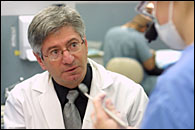
Dr. Herb Borsuka
Faculty of Dentistry
Wood Award for Excellence in Teaching (Faculty of Dentistry)
Today's students have a strong desire to learn and to excel in clinical dentistry. They are highly motivated and are well prepared to master the new skills necessary for them to achieve their goals.
My favourite teacher was my mentor at Boston University, Dr. Herbert Schilder. He was a dynamic teacher and an innovator who made the subject of endodontics live.
My advice to new teachers is to respect your students. Treat them like adults, and enjoy the experience of interacting and educating them.
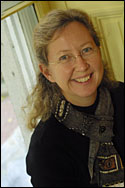
Nathalie Cooke
Department of English
Carrie M. Derick Award for Excellence in Graduate Teaching and Supervision
I have learned from my students to listen. I realized very quickly that teaching is all about listening, but I must admit that doing it consistently is still a daily challenge for me.
My favourite was Miss Brooke, my fourth grade teacher. Nothing got by her that year: her pencils were sharp; her aim with the blackboard chalk was deadly; and when she broke into an approving smile, you knew it meant something.
If new teachers are anything like me, they get stage fright in the classroom. It is easy to forget that students not only want good teachers and good classes, but that they're also willing to help make classes work (and my students have gone the extra mile on many occasions). McGill's students are its best asset. My advice would be to pause occasionally and really enjoy them.
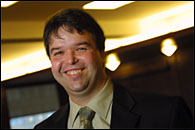
Steve Fortin
Faculty of Management
Distinguished Teaching Award in Faculty of Management (Undergraduate)
Teaching is not easy. Knowing about something is a prerequisite to be able to teach, but this is not sufficient to be an effective teacher. How can one convey his knowledge to students? In my case, it has been a trial and error process - I never hesitate to return to a subject if I feel that I did not do a particularly good job at teaching it. My students have taught me how to teach.
Unfortunately, I cannot single out one teacher as my favourite. I have been exposed to great teachers, and that I have learned a great deal from most. A group of about a dozen has exercised a lasting influence on my life. I cannot forget my grade one teacher, the person who first taught me to read, opening that world of knowledge that books are. Twenty-six years later, I still rank reading as my favourite activity. Nor can I forget some later influences: my "Génies en herbe" coaches in high school, my first accounting teacher in CEGEP, some great professors during both my undergraduate and graduate degrees. Each, in his or her own particular way, has contributed to make me who I am today.
I really do not feel qualified to give advice to new professors, being rather new myself. I never aimed for a teaching award. I just tried to be myself in the classroom, to teach material I think the students need to know to be successful, and to respect them as persons. The rest just followed.
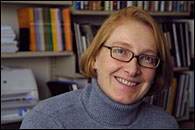
Heather Goad
Department of Linguistics
H. Noel Fieldhouse Award for Distinguished Teaching in the Faculty of Arts
Most importantly, there are many ways to learn - it's been a constant challenge to try and satisfy the needs of a diverse population of students. It has stretched my imagination to find constructive ways to meet this challenge, but I believe that, over the last 10 years at McGill, it has made me a more effective teacher.
I can't say that I have a favourite teacher. What does stand out, though, is the Dept. of Linguistics at UBC where I did my undergraduate studies. It was a positive learning environment where the talents of individual students were recognized and nurtured. For instance, I was encouraged to undertake primary research and to present the results in the department colloquium series. This experience set the course for my future studies and ultimate pursuit of an academic career.
As an institute for higher learning, McGill is the ideal environment for professors to introduce current thinking from their fields of research into the classroom. This enriches the learning experience for students and positions what they're being taught within a broader context.
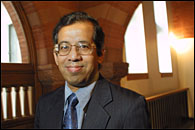
Mainul Hasan
Department of Mining, Metals & Materials Engineering
Ida & Samuel Fromson Award for Outstanding Teaching (Faculty of Engineering)
I have learned from the students how important it is to make connections among different topics in a course and discuss the practical utility of a course in relation to their career objectives. They have also taught me the importance of an organized delivery of lectures.
My teaching method is primitive - chalk and blackboard approach! Irrespective of the diverse nature of the courses I teach, I write and explain everything on the blackboard. Students who take notes in my class hardly feel a need to buy textbooks.
I constantly quiz the students in the class to keep their attention. I always encourage the students to ask me questions and I maintain open door office hours. Good class notes and/or note-pack, mental preparation before each lecture, enthusiasm and sincerity with "always ready to help" attitude and encouragement to the students in a respectful manner should help the delivery of the lectures and the learning process. Occasional cracking of timely, neutral jokes doesn't harm.
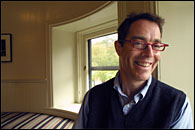
Nicholas Kasirer
Private & Comparative Law
John W. Durford Teaching Excellence Award
Over the years I have asked the many gifted teachers in the law faculty about the secrets of their success in the classroom and have found their answers pretty difficult to understand. Listening to this advice one feels a bit like the gerontologist who discovers that the 110-year-old in the Himalayas doesn't eat yogurt or wheat germ but smokes two packs of unfiltered Gitanes before lunch.
Rightly or wrongly, I have come to believe that there is no secret to good teaching beyond hard work. I do know that students see everything from the back row of the class: the teacher who is unprepared, the teacher who fails to connect teaching and scholarship, the teacher who confuses information and knowledge, the teacher who can't listen, the teacher who doesn't want to be there. One very brilliant colleague from another university once told me that he is "habité par le doute" every minute in the classroom - this strikes me as good and convenient advice for the intellectually curious and harried teacher.
I take heat sometimes for being a formalist: I use "Mr" and "Ms" in the classroom and, of course, frantically vouvoie when teaching in French. Very pompous, no doubt, but it brings a solemnity to teaching that I seem to need. It also helps make the classroom just a little bit other-worldly, which strikes me as at least as good as the alternative.
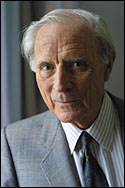
Dr. Robert Kinch
Department of Obstetrics/Gynecology
Osler Teaching Award (Faculty of Medicine)
My teaching consists of working with Clinical Clerks in Obstetrics and Gynecology, in small interactive groups of six, for two months. I get to know them well and I am fascinated by their diverse personalities and backgrounds.
Many of these students have had careers before entering medicine. These span from a jazz musician, to an elementary school teacher, to one who worked for two years in the Department of Public Health at Harvard, to a teacher of rock climbing, to an English Literature teacher at three Ivy League universities in the United States, who then graduated from medical school at the age of 47.
So, following this, my advice to new teachers is to get to know your students, let them teach you, keep them excited and enthusiastic. Keep up your knowledge, but many of these students are adult learners.
Our curriculum is top down, but students should be given chances to use their imagination and enthusiasm in making choices.
I have a clinic in which each student sees three patients almost completely independently. This gives them the opportunity and time to learn to listen, carry out technical skills, work out and convey sound management plans. It gives the teacher and student a great thrill to see how grateful the patients are for the care the student has given them. This approach is reality and, hopefully, will prevent teaching from totally sliding into virtual reality.
My favourite teacher is Dr. Alice Benjamin, my present Chief. Still using a blackboard, she takes students for a wonderful ride through her encyclopedic knowledge.
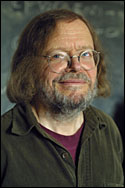
Michael Makkai
Department of Mathematics & Statistics
David Thomson Award for Excellence in Graduate Supervision & Teaching
There are two kinds of knowledge: the fundamental and the systematic. They do mix in practice, but they do not blend. The first was preferred and pursued by the ancient philosopher Plato; the second by his disciple Aristotle. My disposition and my subject - the foundations of mathematics - make me side with Plato, although I must admit that systematic knowledge also has its place in my work. Fundamental knowledge depends on dialogue, the exchange and confirmation of ideas. For me, teaching is the essential form of dialogue that, in addition to being a useful activity, is something that I need to sense the basic "rootedness" of what I am doing. An answer to the initial question is that I learned the truth about important matters in dialogues with my students, often directly from them.
My favourite was my grade seven and eight math teacher, Richard Palvolgyi. His love of mathematics and his desire to communicate that love were elemental forces. Alas, he was not very good at maintaining order in the classroom.
My advice would be to "Love thy subject, and love thy students, in that order. Above all, love the truth." Although this is not a direct quote, I believe it is in the spirit of the thought of Simone Weil (1909-1943), a great thinker and teacher of the last century. Read Weil's writings to learn, among many other things, that the ancients knew much that we tend to forget nowadays.
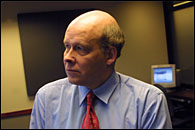
Karl Moore
Faculty of Management
Distinguished Teaching Award in Faculty of Management (Graduate)
I have learned from the students' enthusiasm for new subjects and willingness to challenge the old orthodoxies, something which when you have been in a field for a number of years is sometimes hard to do.
My favourite teacher was Alan Rugman, a colleague at Oxford University. We were both on the faculty, our offices were across the hall and most days we would find time to sit in his office or over coffee in the common room and discuss our shared research interest in International Business. Discuss is probably the wrong word, more like a tutorial, one-on-one with one of the leading scholars in the world. What a wonderful opportunity! What a great teacher!
My advice would be to find out the best teachers in your area, sit in on their classes and spend time discussing teaching as a craft with them. I did this with Ian Fenwick, my area chair at the time, and was very fortunate to have Gareth Morgan, head of my doctoral program, as a mentor. Both proved to be very helpful to my growth as a teacher. And continue to always try to improve, year after year.
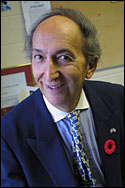
Charles Roth
Department of Mathematics and Statistics
Award for Distinguished Teaching (Continuing Education)
From my best students I learned how to approach a certain topic or problem in a different and sometimes more satisfying manner than previously.
When confronted with students who don't understand some aspect of my lectures, I consider that a challenge to present the material in a more easily comprehensive manner.
My favourite teacher was Prof. Rosenthall of the Mathematics Department at McGill while I was a student in the joint honours Mathematics and Physics program here.
Notwithstanding the fact that he was chairman of the department he took great care and effort in presenting his wonderful lectures, to the extent that I was invariably sorry when the bell rang. He was eloquent, inspiring, in love with mathematics, available and patient with his students.
Take advantage of, usually in the beginning, having small classes in order to build a strong rapport with the students; try to communicate with them rather than lecture to them - try to get them involved in discussions during class.
Realize that students are often under tremendous pressure and thus should be treated with the utmost understanding and consideration without sacrificing academic standards.
Be prepared beyond the level of your lecture material so that you are in a position to answer most questions without hesitation.
Try to make the subject relevant and interesting for the students, respect them, be enthusiastic, give comprehensive and challenging assignments with detailed solutions, try to integrate and unify diverse and seemingly different topics, be available for reasonable office hours where you have the opportunity to deal with students on an individual basis and, finally, try to instill a sense of fun and humour in the lectures.
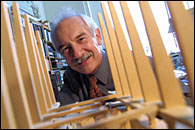
Adrian Sheppard
School of Architecture
Class of '44 Award for Outstanding Teaching (Faculty of Engineering)
The education of an architect presupposes the learning of knowledge and skills, and the exercise of judgement. The most important part is judgement, which differentiates the professional from the skilled technician. It is acquired through critical examination of issues and from discussions - an exchange of ideas. Conversations between young and old are the ever-rewarding gifts to both, if one accepts equivalence in matters of ideas. As in any symbiotic relationship, each learns from the other.
I cannot speak of one favourite teacher while a student. There were many who exerted a significant influence on me. During my undergraduate years, John Bland taught me to understand architecture as an intellectual (rational) process and to see buildings as parts of a historical and contextual continuum. Sandy van Ginkel, more than anyone, made me aware of architecture's larger cultural role and artistic power. At the graduate level, at Yale University, Serge Chermayeff had a most profound impact. He instilled in me a sense of professional idealism and made me recognize architecture as a socially relevant endeavour.
I would tell any new teacher that teaching is a rewarding but demanding discipline, and should only be pursued if one is willing to make a strong commitment to it. I would stress that the primary function of an academic is to teach, to communicate, to give of one's self. The rest is also important, but secondary.
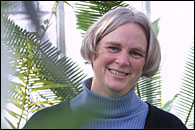
Marcia J. Waterway
Department of Plant Science
Macdonald Campus Award for Teaching Excellence
My students have repeatedly shown me the importance of motivation in teaching. Learning only happens when students become actively engaged with the subject and make an effort to figure things out for themselves. My most important role as a teacher seems to be motivating them to do it.
My favourite was Prof. Herb Wagner, well-known fern specialist at the University of Michigan who taught me in a summer field course on the biology of ferns. He was passionate about field biology, full of energy and full of fun. Every field excursion was an adventure of discovery for him and his enthusiasm was infectious. He had high expectations for his students and we worked hard to live up to his good opinion of us.
Don't hesitate to let your enthusiasm for your subject show. Be organized, consistent, and let the students know what you expect. Challenge students to think and discover things for themselves.
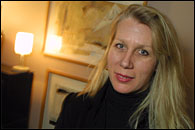
Elizabeth Wood
Department of Integrated Studies in Education
Faculty of Education Award for Distinguished Teaching
My students have taught me that they are the central, dynamic element in their learning process. They have also taught me more about myself and about the world - as it is and as we might envision it - than I would ever have had the courage to imagine on my own.
If favourite can mean most important, my mentor, Dr. William Lawlor, is that person. As a professor in the Faculty of Education, he took risks in the classroom, and modelled compassion. He asked tough questions. By his example, he taught me to think about what mattered to me, to teach in a way that reflected who I was, and to discard the prescribed image of what a university professor must be.
Respect your students. Listen. Care about them. Have fun. Be a real person, not a robot. Value the process. If you can do this, your students will reciprocate and their learning - and yours - will be deeper, more lasting, more real.
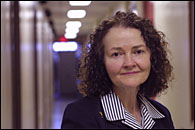
Edith Zorychta
Department of Pathology
Leo Yaffe Award for Excellence in Teaching (Faculty of Science)
McGill students are very observant and well informed, they provide an ongoing reality check on how effectively your course content relates to the rest of their curriculum, allowing you to eliminate redundant material and add appropriate topics as you continually update the information. They are also very honest about what works and does not work in the way you design and deliver a course, so listening to students over the years has inevitably made me a better teacher. The dialogue also keeps me aware of the evolving problems, frustrations and advantages of being a student now, compared to 10 or 20 years ago - information that is vital for a communal atmosphere in the classroom.
As a university undergraduate I had several "favourite" teachers, in both arts and science. One completely transformed my concept of history as a discipline - she made the connections between past and present, and for the first time I understood the relevance of history in understanding human behaviour. A psychology professor illustrated every disorder with such interesting case histories that it was impossible to forget any of them. A professor of genetics taught so clearly, with examples from everyday life, that learning was almost effortless. These teachers had at least two features in common - they stimulated us to think, not just memorize, and their students rarely missed lectures, for no textbook or set of notes made learning as enjoyable or as easy as being in class.
Create an environment in the classroom that you would enjoy if you were a student, and be flexible - adapt your teaching style to the class size and background. When possible, use illustrations to reinforce what you say, to emphasize the relevance of what you are teaching, and to help stimulate the students to think in new dimensions. Ask experienced colleagues for advice and information when you need it. Watch your students while you teach - boredom and incomprehension are both unmistakable and can be instantly eliminated. Prepare and organize lecture material thoroughly in advance so that you can relax - teaching is a highly creative process and should be fun.

